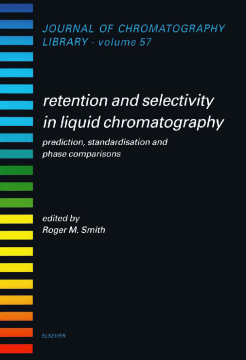
Additional Information
Book Details
Abstract
This book brings together a number of studies which examine the ways in which the retention and selectivity of separations in high-performance liquid chromatography are dependent on the chemical structure of the analytes and the properties of the stationary and mobile phases. Although previous authors have described the optimisation of separations by alteration of the mobile phase, little emphasis has previously been reported of the influence of the structure and properties of the analyte.
The initial chapters describe methods based on retention index group increments and log P increments for the prediction of the retention of analytes and the ways in which these factors are influenced by mobile phases and intramolecular interactions. The values of a wide range of group increments in different eluents are tabulated.
Different scales of retention indices in liquid chromatography are described for the comparison of separations, the identification of analytes and the comparison of stationary phases. Applications of these methods in the pharmaceutical, toxicology, forensic, metabolism, environmental, food and other fields are reviewed. The effects of different mobile phases on the selectivity of the retention indices are reported. A compilation of sources of reported retention index values are given.
Methods for the comparison of stationary phases based on the interactions of different analytes are covered, including lipophilic and polar indices, shape selectivity comparisons, their application to novel stationary phases, and chemometric methods for column comparisons.
Notwithstanding the major role high-performance liquid chromatography plays in contemporary analytical chemistry, the fundamental processes leading to analyte separation are still not universally understood. This book should go a long way to rectify this situation. This book is highly recommended.
Chromatographia
The contents accurately reflect the extended title and the individual chapters have been very exhaustively researched and are well written.
The Analyst
Prof. T. Jinno
The editor has succeeded in gathering important and valuable contributions from all over the world. The proposals by all authors in this book are still in the development stage but in the near future, with the development of computer technology and analytical instrumentation, the importance of these concepts will increase and increase. The book clearly indicates what will be most important in LC separations and chromatography in the future.
Journal of Chromatography A
This book overall, is very well written and discusses topics which have not been discussed in detail previously. The book is also well organized and avoids repetition which can be annoying. The overall discussion is concise and to the point. I found the book to be both interesting and helpful. It is recommended for all those who use HPLC.
Journal of Liquid Chromatography & Related Technologies
